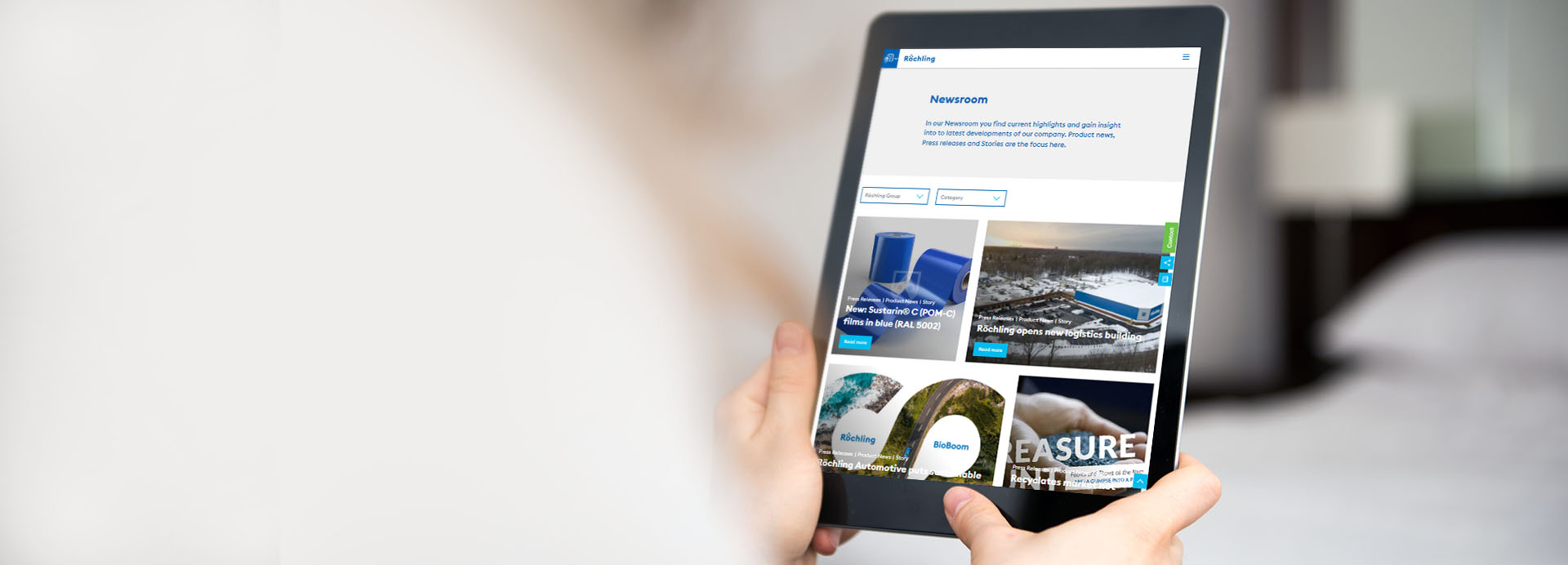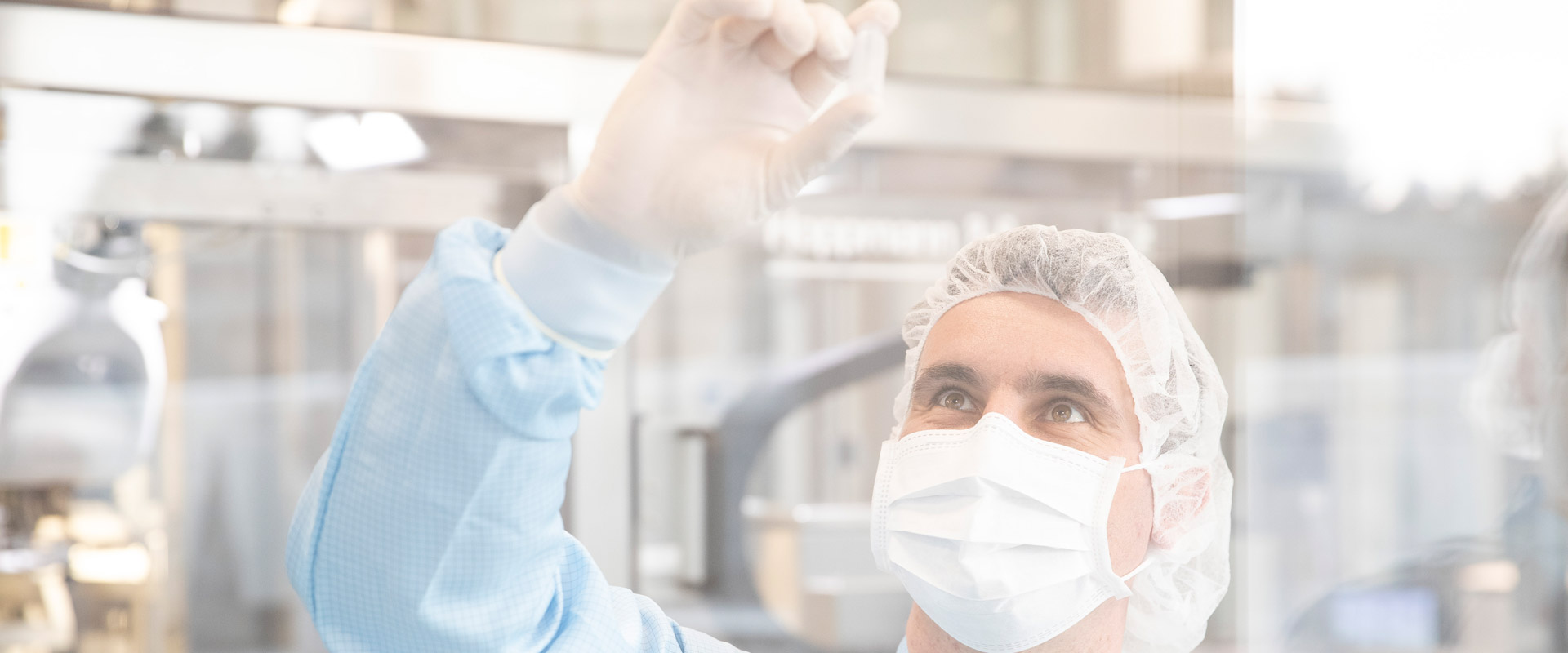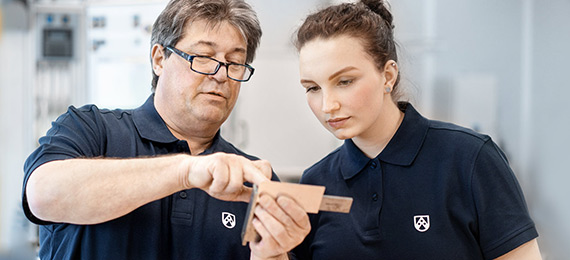- 2020 financial year: Sales decline to EUR 2.039 billion due to global lockdowns
- Industrial Division: Exceptional boom in individual markets stabilizes sales revenues
- Automotive Division: Earnings reduced by temporary decline in customer orders
- Medical Division: Postponed operations and decline in doctor visits lead to drop in sales
Mannheim, 20 May 2021 | With its three divisions Industrial, Automotive and Medical, the Röchling Group felt the effects of the coronavirus pandemic last year. Sales of the Mannheim-based plastics specialist thus fell by EUR 312.7 million to EUR 2.039 billion compared with the previous year – down 13.3 percent. This marked the end of a period of ten years in which the Röchling Group recorded an annual increase in sales. The second quarter of 2020 in particular was characterized by short-term plant closures by automotive manufacturers, the effects of which were clearly reflected in the Automotive Division. As a result of the tense situation, earnings before tax (EBT) fell significantly from EUR 81.9 million to just EUR 2.3 million.
At the end of last year, Röchling employed a total of 11,094 people. The number of employees thus fell by 380 compared with the previous year. This is due both to personnel adjustments as a result of the coronavirus pandemic as well as the “Driving Future” restructuring program at Röchling Automotive, which had already begun before the onset of the pandemic. This program has since been successfully completed.
The current financial year continues to be characterized by the effects of the coronavirus pandemic. In addition, the shortage of raw materials and semiconductors and the associated price increases on the global market are currently noticeable. Despite these volatile conditions, sales in the first quarter of 2021 were again at a higher level than in the second and third quarters of last year. After initial major logistical problems between Great Britain and Germany following Brexit, the Mannheim-based plastics specialist Röchling is not recording any major economic effects from Great Britain’s exit from the European Union on 1 February 2021, contrary to original assumptions. This applies equally to its three divisions.
Due to the duration of the coronavirus pandemic and the continuing high number of new coronavirus infections coupled with the emergence of ever new virus mutations, the medium- and long-term consequences of the pandemic are still not foreseeable. Further economic development will depend to a large extent on the global vaccination campaigns and the resulting forecast easing of the lockdown measures. The calming of the markets for plastic raw materials and semiconductors will also be of key importance. Despite these unpredictable general conditions, the Röchling Group anticipates sales growth in the high single-digit percentage range for 2021. However, the company will not yet return to a pre-pandemic level. This is mainly due to the expected development of the Automotive Division, where the recent short-time work at some car manufacturers due to the lack of raw materials and semiconductors is clearly noticeable.
“Despite the significant decline in sales, we got off lightly in the past financial year. The fourth quarter of 2020 particularly helped us to make up for previous losses to some extent. The beginning of 2021 also indicates a stabilization of our business, as overall sales revenues are back at the same level of the previous year’s quarter, when the effects of the coronavirus pandemic had not yet impacted our business,” emphasized Prof. Hanns-Peter Knaebel, CEO of the Röchling Group, when presenting the business figures on Thursday, 20 May 2021, at the annual financial press conference.
Last year, the Röchling Group invested EUR 86.7 million in its infrastructure and production and manufacturing capacities. This was EUR 34.4 million less than in the previous year. This decline affected all three divisions equally and was a consequence of the overall economic situation already described. In addition to necessary replacement and sensible rationalization investments, there were only limited expansion investments. The construction of a new production building at the Röchling Medical Neuhaus site in Thuringia/Germany represents a significant investment in the future. With a volume of EUR 50 million, this is the Medical Division’s largest investment in buildings and machinery to date. With the new building, the Röchling Group is laying the course for the further growth of the company’s youngest division. The expansion of production capacity will create 30 new jobs. Röchling Medical is to build a four-story building with a total area of 1,850 m2 by the beginning of 2023. It will include class C and D clean rooms for extrusion blow molding production.
Of the Röchling Group’s 11,094 employees, 571 work in Baden-Württemberg and 1,135 in Rhineland‑Palatinate. In Germany, the company employed a total of 4,379 people as of 31 December 2020, 202 fewer than in the previous year. As of the reporting date, 3,863 people were employed in the Industrial Division, 6,011 in the Automotive Division and 1,155 in the Medical Division. The number of employees was thus below the previous year in all divisions, but above the 2018 level in Industrial and Medical. A total of 316 young people completed their training within the Röchling Group. As before, the Röchling Group is represented at 90 locations in 25 countries worldwide. 57 locations are in Europe, 18 in Asia, and 15 in America.
In the past year, the Röchling Group generated 36.5 percent of its total sales in Germany, while the rest of Europe contributed 32.8 percent. While the share of sales for the Americas remained stable at 18.3 percent, it grew slightly in Asia by two percentage points to 12.4 percent.
For the Röchling Group, the first quarter of 2021 was characterized by a further easing of the economic situation, which had already been indicated in the fourth quarter of the previous year. Sales revenues amounted to EUR 558.9 million and therefore were only slightly below the previous year’s level. The Industrial Division was particularly responsible for this pleasing result, increasing its sales by EUR 24.3 million year-on-year to EUR 243.7 million. While the Medical Division only just exceeded the previous year’s level at EUR 43.9 million (2020: EUR 43.5 million), Automotive sales fell by EUR 25.8 million to EUR 272.1 million. “We still had a very good quarter last year, particularly in Europe and the USA. The result for the first quarter of 2021 is primarily due to the supply of raw materials, which indirectly affected us, as a number of automotive manufacturers either ran their plants at reduced capacity or even paused them altogether due to the shortage of semiconductors, especially in Europe and the USA,” reported Prof. Knaebel. Incoming orders were at a satisfactory level in all three divisions. The number of employees increased slightly to 11,138 in the first three months of the current year due to the increased demand for Röchling products.
Industrial Division
Exceptional boom in individual markets stabilizes sales revenues
Last year, the Industrial Division had to deal with the interruptions to supply chains and production processes caused by the pandemic. During the first global lockdown, several sales markets necessary to German plastics processors collapsed, massively in some cases. As a result, raw material prices fell due to excess supply. This has since given way to a significant shortage and thus an increase in the cost of raw materials, which started becoming evident in the fourth quarter of 2020.
The coronavirus pandemic put pressure on both sales and incoming orders in the Industrial Division at the beginning of 2020. In almost all countries, customers and suppliers suffered from the local regulations and had to temporarily restrict their operations, at least partly. Sales in industrial sectors with long-term projects and business cycles, such as the paper or electrical industries, were able to mitigate the negative effect. The food industry, health care and intralogistics also initially showed a comparatively good level of demand.
Overall, the Industrial Division generated sales of EUR 801.7 million in the 2020 financial year. Although this was 5.3 percent below the previous year, it was also slightly below the decline in sales in the plastics processing industry as a whole, which amounted to 5.6 percent. “The decline in sales at Röchling Industrial was therefore moderate, as markets that had not previously been the main focus served in particular to compensate for weakening industries,” said Franz Lübbers, CEO of Röchling Industrial, during the annual financial press conference. For example, swimming pool construction in the private sector experienced a persistent exceptional boom and achieved a sustained increase in sales, which somewhat mitigated the slump in other sectors. “We are doing very well in the first quarter of 2021. Business is currently being driven primarily by the Asian and American markets. In Europe, too, we are noticing that demand for our products is rising again,” Lübbers said.
At EUR 31.3 million, Röchling Industrial still made about 80 percent of its planned investments (EUR 40 million), despite the impact of the coronavirus pandemic. Production facilities were built at several locations and investments were made in the automation of manufacturing. Investments were also made in the expansion of the Industrial Center at the Haren location and in two logistics centers in the USA. The number of employees decreased slightly in the course of 2020 from 3,959 to 3,863.
Automotive Division
Earnings reduced by temporary decline in customer orders
The coronavirus pandemic had a massive impact on the international automotive markets, where it significantly accelerated the transformation process in drive technology. Sales fell in almost all countries of the world last year, in some cases drastically. For example, the five largest automotive markets in Europe (Germany, France, Italy, Spain and the UK) recorded declines in the double-digit percentage range. In Europe, automotive sales dropped by 3.8 million units to just under 12 million.
As part of the first lockdown to combat the coronavirus in spring 2020, numerous automotive manufacturers responded to the decline in sales with short-term plant closures and short‑time work. Röchling Automotive also had to take these measures due to a lack of customer demand. However, there was a recovery in the automotive market from the third quarter of 2020.
Overall, Röchling Automotive’s sales revenues of EUR 1,075.6 million were significantly below the previous year’s level of EUR 1,336.1 million. A certain recovery of the market was particularly noticeable in the fourth quarter with sales of EUR 321.1 million – the strongest quarter in 2020. This development continued at the beginning of 2021, even though sales in the first quarter of 2021 were still below those of the first three months of 2020.
“We are confident that the situation with semiconductors will improve this quarter, but it will certainly keep us busy well into the third quarter. If business options present themselves to suppliers outside of the automotive sector, then of course they will be taken. For example, semiconductors were supplied to the consumer electronics industry significantly more than to the automotive sector – mostly also with better conditions,” said Prof. Knaebel, CEO of Röchling Automotive, explaining the semiconductor bottlenecks.
Röchling Automotive put the brakes on investments due to the economic situation. At EUR 36.1 million, the division thus invested a total of EUR 23.3 million less than in the previous year. In addition to investments in the logistics building at the site in Worms and in the logistics hall in Peine, investments were made in injection molding equipment for several locations. The number of employees decreased by 256 to 6,011.
Medical Division
Postponed operations and decline in doctor visits lead to drop in sales
The coronavirus pandemic also had a significant impact on the Medical Division last year. The postponement of surgeries, the decline in doctor visits and prescriptions, and the change in treatment intervals weakened the division’s sales. Experts believe that the sales performance, coupled with high price pressure and stringent regulatory requirements, will bring fundamental market and competitive changes in the medium and long term. According to the industry association Spectaris, sales in the German medical technology sector had already fallen by around 4 percent to approximately EUR 32 billion last year.
Röchling Medical recorded a 4.4 percent decline in sales to EUR 163.9 million in 2020. “Initially, some locations still benefited from increased demand at the beginning of the year. In anticipation of uncertain supply chains, key customers still made stockpiling purchases in the first months of the pandemic, but this reversed as the year progressed. However, the numerous restrictions led to delays in validations and approvals for new projects. High infection rates in the USA, as well as continued reluctance to see doctors and a focus in hospitals and laboratories on COVID-19 testing, led to increasingly subdued sales across the entire division. “We expect the situation to improve as the pandemic situation stabilizes with increased offers of vaccinations,” said Röchling Medical CFO Evelyn Thome.
In this division, too, investments were reduced last year compared with the previous year, from EUR 20.7 million to EUR 18.5 million. In addition to investments in the building expansion at the site in Rochester, USA, investments were made in machinery and automation. The number of employees was reduced by 37 to 1,155. This reduction mainly affected the Americas.
Outlook for 2021
The global economy will continue to recover in 2021 after last year’s coronavirus shock, although it will not yet reach pre-crisis levels everywhere. The International Monetary Fund expects global economic growth of 6.0 percent in the current year. This assumption is also based on large amounts of financial support in some major economies, but also by the expected vaccine-led recovery in the second half of 2021. The shortage of raw materials and the bottleneck in semiconductors need to be managed.
“With a solid first quarter, we have had a good start to 2021. This is perhaps a little modest, because we know that there are still some tasks ahead of us that we need to tackle this year. In order to remain competitive, we will continue to invest in our infrastructure and production and manufacturing capacities where this is important for further sales growth. We are convinced that we have passed the lowest point economically, provided there are no unexpected setbacks in the fight against the coronavirus and in the supply of raw materials and semiconductors. The uncertain starting situation is prompting us to act cautiously without losing sight of the strategic focus topics,” Prof. Knaebel emphasized on Thursday.






